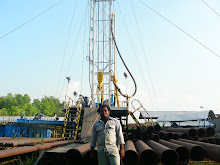A low-level campaign of terror linked to the legislative elections continued in restive Papua Province over the weekend, with police saying the Free Papua Movement had threatened to blow up a power plant in Jayapura, and the discovery of two pipe bombs near the Abepura Police station.
Jayapura Police Chief Robert Djoenso said they received a message from the rebel group, or OPM, on Saturday, threatening to blow up the diesel power plant in Waena in the provincial capital.
“Police officers have been deployed to secure the area,” Djoenso said on Sunday. “And we hope that the local residents will also help..”
The power plant supplies electricity to Jayapura and Keerom district. It is located near Cendrawasih University’s rectorate building, which was set on fire on Thursday.
In other incidents, two homemade pipe bombs were found 400 meters from the Abepura Police station on Sunday, the Antara news agency reported.
The devices, measuring about 30 centimeters long, were discovered by three trash collectors in a trash bin.
“The bombs were taken to Mobile Brigade [Brimob] headquarters,” a witness, Oka Bertha, was quoted by Antara as saying.
Papua received terror threats in the run-up to Election Day.
Last week, thousands of people rallied in Jayapura demanding independence and threatening to boycott the elections.
On Thursday, hundreds of people armed with bows and arrows and firearms attacked the Abepura Police station. Police opened fire on the crowd, killing one and injuring four others.
Six people had been detained and eight others interrogated by the Papua Police in connection to the attack.
The threats have also caused delays in the counting of votes in several polling stations in Abepura. Of the 173 stations, only 90 percent of them had been counted as of Sunday.
Papua Police Chief Bagus Eko Danto said that the attacks possibly involved the OPM, judging by the pamphlets they had left.
In a 2001 law, the government granted special autonomy status to Papua, making the resource-rich province more independent.
The province’s increased power and revenue, however, have not translated into improvements in the living conditions of the majority of the local population, particularly ethnic Papuans.

No comments:
Post a Comment